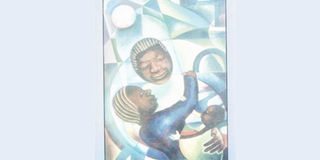Prime
Kiguli conveys need for progressive turn

What you need to know:
This book is divided into several sections, each focusing on a particular theme viz Protest, the Relational, Nature and Existential poems
Book Title: The Africa Saga
Author: Susan N Kiguli
Year of Publication: 2003
Pages: 95
Price: Shs 40,000
Where: Femrite library
PHILIP MATOGO
According to the stars of the Zodiac, those born in the month of June are typically ruled by Mercury, the planet of communication and intellect. Going by that metric, Susan Nalugwa Kiguli (born June 24) is a natural born poet and literary juggernaut. Her poetry collection, entitled The Africa Saga, confirms her planetary influences while launching her poetry works into the literary stratosphere.
This book is divided into several sections, each focusing on a particular theme viz Protest, the Relational, Nature and Existential poems.
Falling under Poems of Protest, Kiguli’s poems are not loud and abrasive but aligned to a temperament that is probing instead of prosecutorial. Her every word and inflection is empathetic if emphatic, channeling the need for progressive change.
In the poem You Tell Me To Wait, the poet employs the poetic device of anaphora—the repetition of words at the beginning of successive lines for emphasis—to add rhetorical heft to the weightlessness of words that float like butterflies, but sting like bees.
“You tell me to wait...
While you build glamorous mansions
You tell me to wait…
While you eat anchovy toast
You tell me to wait…
While you spoon marmalade jam
You tell me to wait…
While you drape your wife in lace…
You tell me to wait…
While the sun stabs my bear back
You store me in a cage…
While you pocket my meagre wage.”
The stanza reads in part. Notice the clever use of ellipses, these consist of three evenly spaced dots and are used, in this case, to show how the poet is waiting. They omit any finality that any added word would otherwise denote or connote.
Notice also the juxtapositioning of the persona’s suffering alongside the opulent living of the person or persons telling the persona to wait. This opulent living is shown by those persons (telling the persona to wait) eating anchovy toast, which is a luxury food because of its rarity, delicacy, and high price.
The contrast in material experiences serves as a parody of the word “wait” because asking someone to wait before you address their suffering presupposes that the means are not available to alleviate it. Yet if somebody can afford luxury foods, they can surely afford the necessity of handing the sufferer a lifeline without any need for a wait.
It is the tale of two haves: the haves and the have nots. Made worse, I might add, by the persona being treated like an animal. To be sure, the persona speaks of their “bear” back instead of the homophone “bare” back.
When it comes to the Relational Poems, the poet drops her earlier eschewal of metaphorical language to allow her words to become more evocative.
The last section of this book falls under Existential Poems. Jean-Paul Sartre, the French philosopher and playwright, explains Existentialism as a form of Humanism with the words: “We mean that man first exists: he materialises in the world, encounters himself, and only afterward defines himself.”




